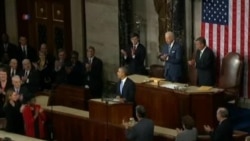WASHINGTON —
In his annual State of the Union Address to Congress, President Barack Obama promised to use executive powers to help the middle class and the poor and reverse a widening income gap between the rich and poor.
While low-wage workers may like what the president is proposing, his conservative critics say measures like imposing a higher minimum wage is bad for business and acting without Congressional approval is bad for democracy.
President Obama promised action on raising the minimum wage in his speech to a joint session of Congress.
"In the coming weeks, I will issue an Executive Order requiring federal contractors to pay their federally-funded employees a fair wage of at least $10.10 an hour - because if you cook our troops’ meals or wash their dishes, you shouldn’t have to live in poverty," he said.
The news elicited cheers from worker rights activists with the group Change to Win in Washington, DC. Some of the group’s members, like Robyn Law, come under this action because they work for contractors in government buildings in food preparation and cleaning service jobs. So the president just promised them a raise.
"He just announced it in front of the whole national world. So it's like once you tell us something you cannot, not do it. That's [would be] just like breaking a promise," said Law.
President Obama said the U.S. must do more to reverse a trend toward greater income inequality. Under the Affordable Care Act, millions of low wage workers, he said, will now be eligible for either subsidized or free healthcare. He asked Congress to raise the minimum wage for all Americans, give tax incentives to businesses that create jobs at home, end tax breaks for companies that send jobs overseas, and increase worker training programs. But the president also said if Congress will not act, he will use executive orders, where he can, to impose his agenda.
"I’m eager to work with all of you. But America does not stand still - and neither will I," he said. "So, wherever and whenever I can take steps without legislation to expand opportunity for more American families, that’s what I’m going to do.”
Conservative economists maintain that too much government intervention will make it harder for businesses to grow and create jobs. Republican Congressman Morgan Griffith from Virginia says he is concerned that the president may be exceeding his authority by using executive actions to bypass Congressional opposition.
"He is supposed to work with Congress to reach these solutions. A failure to be able to do that is a failure of his leadership style," said Griffith.
Obama has signaled that income inequality will be his domestic focus during the upcoming Congressional elections. But some critics and supporters have urged the president to engage more with Congress and to focus on areas where both sides agree, like tax breaks for businesses that create good jobs.
While low-wage workers may like what the president is proposing, his conservative critics say measures like imposing a higher minimum wage is bad for business and acting without Congressional approval is bad for democracy.
President Obama promised action on raising the minimum wage in his speech to a joint session of Congress.
"In the coming weeks, I will issue an Executive Order requiring federal contractors to pay their federally-funded employees a fair wage of at least $10.10 an hour - because if you cook our troops’ meals or wash their dishes, you shouldn’t have to live in poverty," he said.
The news elicited cheers from worker rights activists with the group Change to Win in Washington, DC. Some of the group’s members, like Robyn Law, come under this action because they work for contractors in government buildings in food preparation and cleaning service jobs. So the president just promised them a raise.
"He just announced it in front of the whole national world. So it's like once you tell us something you cannot, not do it. That's [would be] just like breaking a promise," said Law.
President Obama said the U.S. must do more to reverse a trend toward greater income inequality. Under the Affordable Care Act, millions of low wage workers, he said, will now be eligible for either subsidized or free healthcare. He asked Congress to raise the minimum wage for all Americans, give tax incentives to businesses that create jobs at home, end tax breaks for companies that send jobs overseas, and increase worker training programs. But the president also said if Congress will not act, he will use executive orders, where he can, to impose his agenda.
"I’m eager to work with all of you. But America does not stand still - and neither will I," he said. "So, wherever and whenever I can take steps without legislation to expand opportunity for more American families, that’s what I’m going to do.”
Conservative economists maintain that too much government intervention will make it harder for businesses to grow and create jobs. Republican Congressman Morgan Griffith from Virginia says he is concerned that the president may be exceeding his authority by using executive actions to bypass Congressional opposition.
"He is supposed to work with Congress to reach these solutions. A failure to be able to do that is a failure of his leadership style," said Griffith.
Obama has signaled that income inequality will be his domestic focus during the upcoming Congressional elections. But some critics and supporters have urged the president to engage more with Congress and to focus on areas where both sides agree, like tax breaks for businesses that create good jobs.






